NURBN 1001: Legal and Ethical Considerations in Taylah's Case
VerifiedAdded on 2023/03/31
|9
|2036
|440
Essay
AI Summary
This essay discusses the legal and ethical considerations in the case of Taylah, a 14-year-old girl seeking contraception at a sexual health clinic. The essay identifies relevant ethical principles, including autonomy, non-malfeasance, beneficence, and justice, and analyzes their application to Taylah's situation, considering her age, diabetic condition, and self-esteem issues. It emphasizes the importance of respecting Taylah's autonomy while also recognizing her need for guidance and support, especially concerning parental involvement. The essay also highlights the nurse's duty to avoid harm, act in Taylah's best interest, and ensure fair and equal treatment, advocating for mental health therapy and responsible decision-making.
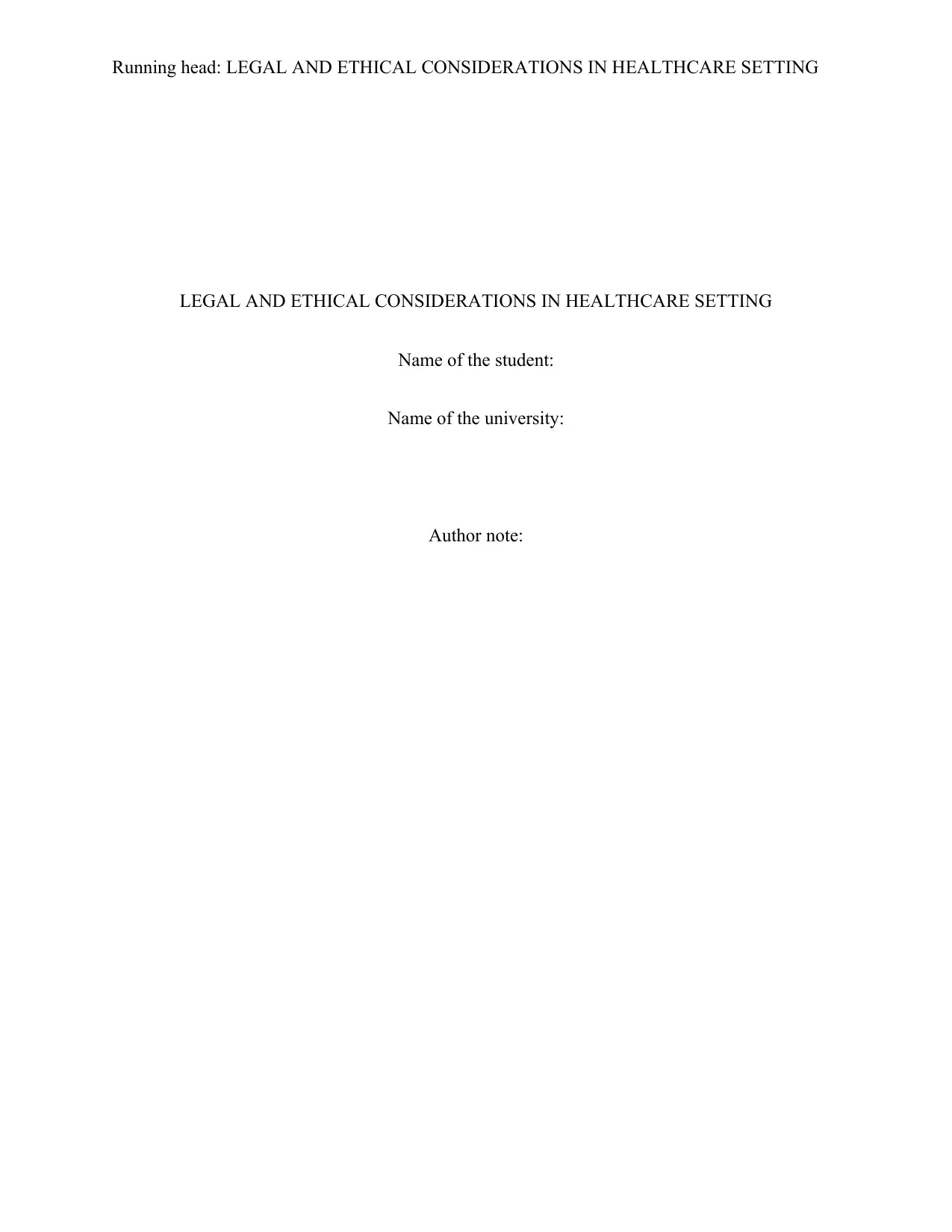
Running head: LEGAL AND ETHICAL CONSIDERATIONS IN HEALTHCARE SETTING
LEGAL AND ETHICAL CONSIDERATIONS IN HEALTHCARE SETTING
Name of the student:
Name of the university:
Author note:
LEGAL AND ETHICAL CONSIDERATIONS IN HEALTHCARE SETTING
Name of the student:
Name of the university:
Author note:
Paraphrase This Document
Need a fresh take? Get an instant paraphrase of this document with our AI Paraphraser
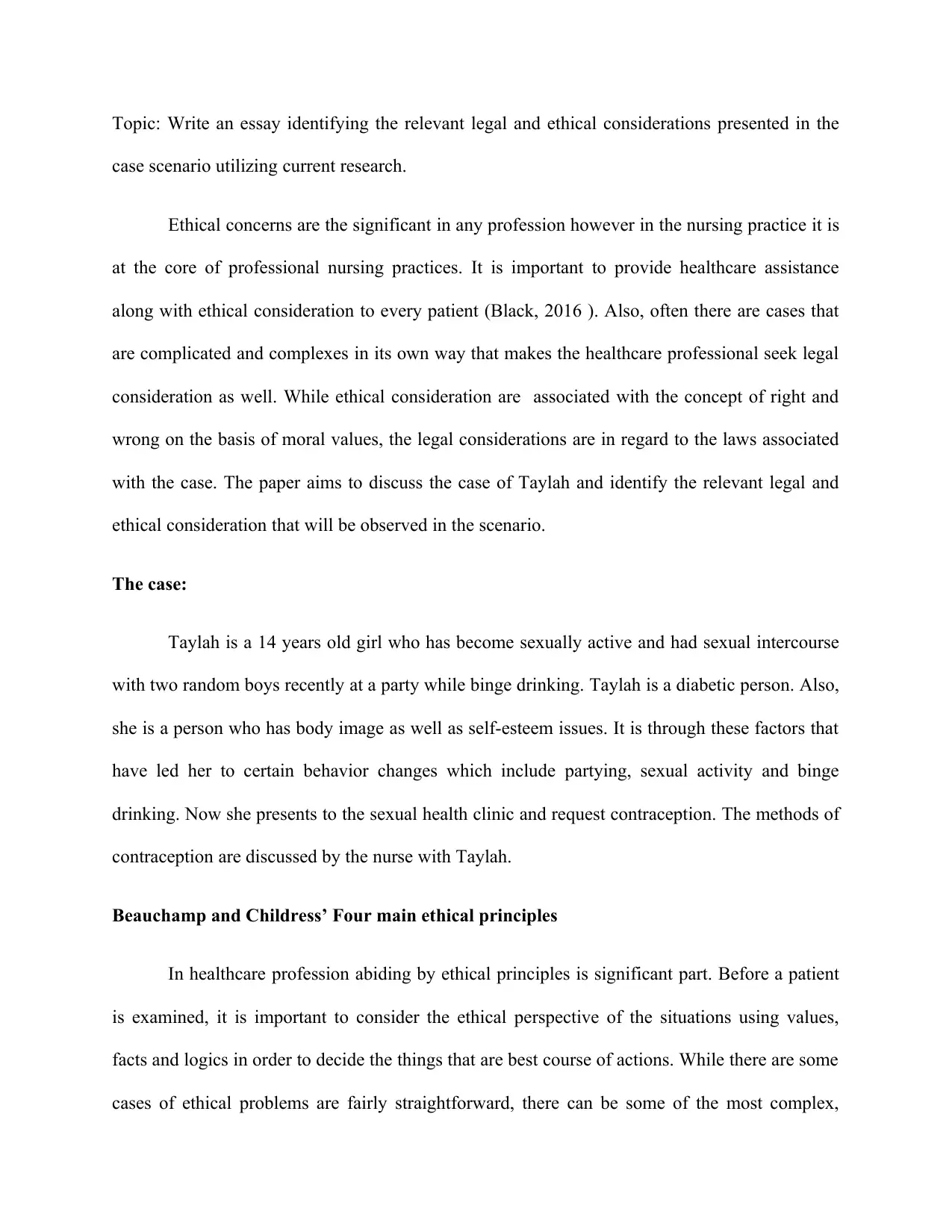
Topic: Write an essay identifying the relevant legal and ethical considerations presented in the
case scenario utilizing current research.
Ethical concerns are the significant in any profession however in the nursing practice it is
at the core of professional nursing practices. It is important to provide healthcare assistance
along with ethical consideration to every patient (Black, 2016 ). Also, often there are cases that
are complicated and complexes in its own way that makes the healthcare professional seek legal
consideration as well. While ethical consideration are associated with the concept of right and
wrong on the basis of moral values, the legal considerations are in regard to the laws associated
with the case. The paper aims to discuss the case of Taylah and identify the relevant legal and
ethical consideration that will be observed in the scenario.
The case:
Taylah is a 14 years old girl who has become sexually active and had sexual intercourse
with two random boys recently at a party while binge drinking. Taylah is a diabetic person. Also,
she is a person who has body image as well as self-esteem issues. It is through these factors that
have led her to certain behavior changes which include partying, sexual activity and binge
drinking. Now she presents to the sexual health clinic and request contraception. The methods of
contraception are discussed by the nurse with Taylah.
Beauchamp and Childress’ Four main ethical principles
In healthcare profession abiding by ethical principles is significant part. Before a patient
is examined, it is important to consider the ethical perspective of the situations using values,
facts and logics in order to decide the things that are best course of actions. While there are some
cases of ethical problems are fairly straightforward, there can be some of the most complex,
case scenario utilizing current research.
Ethical concerns are the significant in any profession however in the nursing practice it is
at the core of professional nursing practices. It is important to provide healthcare assistance
along with ethical consideration to every patient (Black, 2016 ). Also, often there are cases that
are complicated and complexes in its own way that makes the healthcare professional seek legal
consideration as well. While ethical consideration are associated with the concept of right and
wrong on the basis of moral values, the legal considerations are in regard to the laws associated
with the case. The paper aims to discuss the case of Taylah and identify the relevant legal and
ethical consideration that will be observed in the scenario.
The case:
Taylah is a 14 years old girl who has become sexually active and had sexual intercourse
with two random boys recently at a party while binge drinking. Taylah is a diabetic person. Also,
she is a person who has body image as well as self-esteem issues. It is through these factors that
have led her to certain behavior changes which include partying, sexual activity and binge
drinking. Now she presents to the sexual health clinic and request contraception. The methods of
contraception are discussed by the nurse with Taylah.
Beauchamp and Childress’ Four main ethical principles
In healthcare profession abiding by ethical principles is significant part. Before a patient
is examined, it is important to consider the ethical perspective of the situations using values,
facts and logics in order to decide the things that are best course of actions. While there are some
cases of ethical problems are fairly straightforward, there can be some of the most complex,
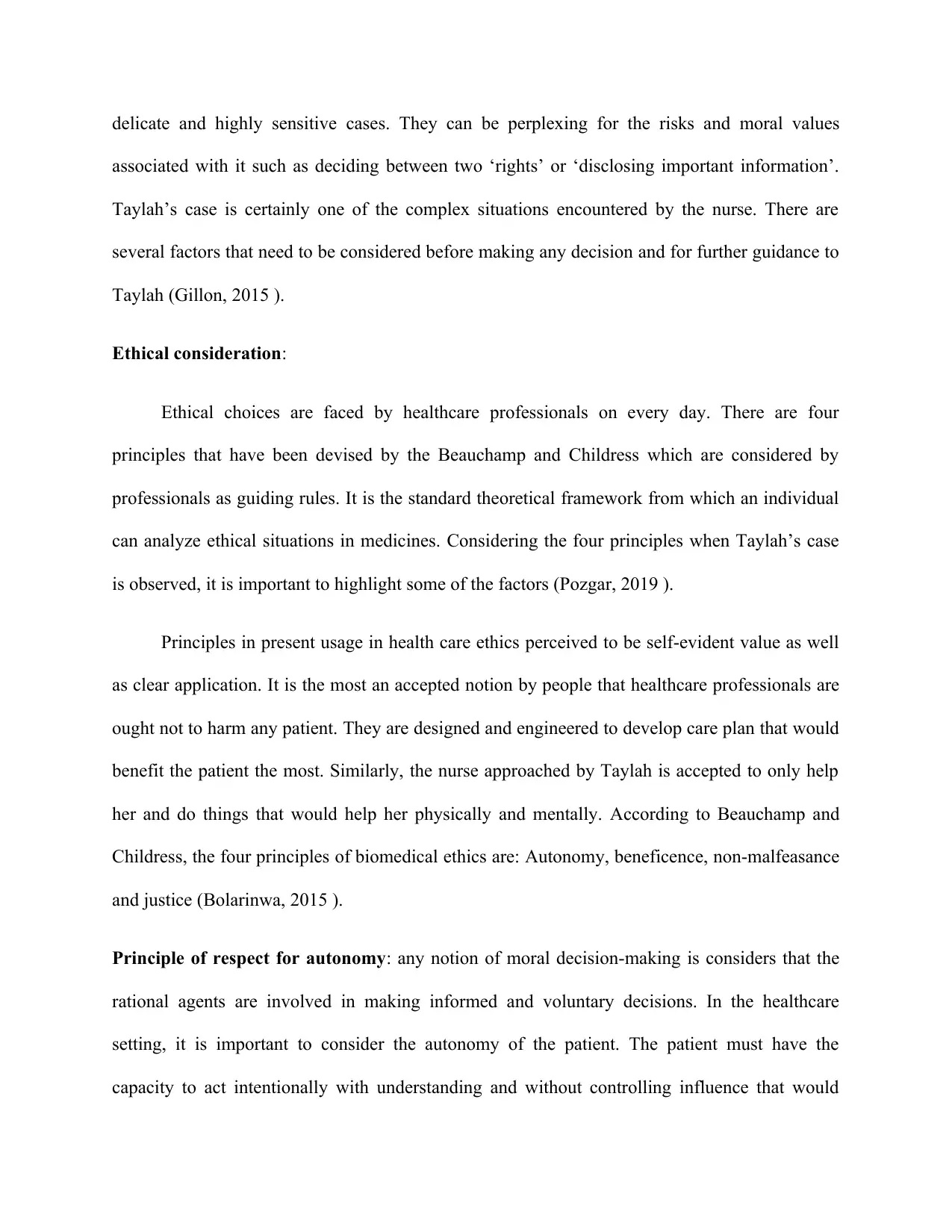
delicate and highly sensitive cases. They can be perplexing for the risks and moral values
associated with it such as deciding between two ‘rights’ or ‘disclosing important information’.
Taylah’s case is certainly one of the complex situations encountered by the nurse. There are
several factors that need to be considered before making any decision and for further guidance to
Taylah (Gillon, 2015 ).
Ethical consideration:
Ethical choices are faced by healthcare professionals on every day. There are four
principles that have been devised by the Beauchamp and Childress which are considered by
professionals as guiding rules. It is the standard theoretical framework from which an individual
can analyze ethical situations in medicines. Considering the four principles when Taylah’s case
is observed, it is important to highlight some of the factors (Pozgar, 2019 ).
Principles in present usage in health care ethics perceived to be self-evident value as well
as clear application. It is the most an accepted notion by people that healthcare professionals are
ought not to harm any patient. They are designed and engineered to develop care plan that would
benefit the patient the most. Similarly, the nurse approached by Taylah is accepted to only help
her and do things that would help her physically and mentally. According to Beauchamp and
Childress, the four principles of biomedical ethics are: Autonomy, beneficence, non-malfeasance
and justice (Bolarinwa, 2015 ).
Principle of respect for autonomy: any notion of moral decision-making is considers that the
rational agents are involved in making informed and voluntary decisions. In the healthcare
setting, it is important to consider the autonomy of the patient. The patient must have the
capacity to act intentionally with understanding and without controlling influence that would
associated with it such as deciding between two ‘rights’ or ‘disclosing important information’.
Taylah’s case is certainly one of the complex situations encountered by the nurse. There are
several factors that need to be considered before making any decision and for further guidance to
Taylah (Gillon, 2015 ).
Ethical consideration:
Ethical choices are faced by healthcare professionals on every day. There are four
principles that have been devised by the Beauchamp and Childress which are considered by
professionals as guiding rules. It is the standard theoretical framework from which an individual
can analyze ethical situations in medicines. Considering the four principles when Taylah’s case
is observed, it is important to highlight some of the factors (Pozgar, 2019 ).
Principles in present usage in health care ethics perceived to be self-evident value as well
as clear application. It is the most an accepted notion by people that healthcare professionals are
ought not to harm any patient. They are designed and engineered to develop care plan that would
benefit the patient the most. Similarly, the nurse approached by Taylah is accepted to only help
her and do things that would help her physically and mentally. According to Beauchamp and
Childress, the four principles of biomedical ethics are: Autonomy, beneficence, non-malfeasance
and justice (Bolarinwa, 2015 ).
Principle of respect for autonomy: any notion of moral decision-making is considers that the
rational agents are involved in making informed and voluntary decisions. In the healthcare
setting, it is important to consider the autonomy of the patient. The patient must have the
capacity to act intentionally with understanding and without controlling influence that would
⊘ This is a preview!⊘
Do you want full access?
Subscribe today to unlock all pages.

Trusted by 1+ million students worldwide
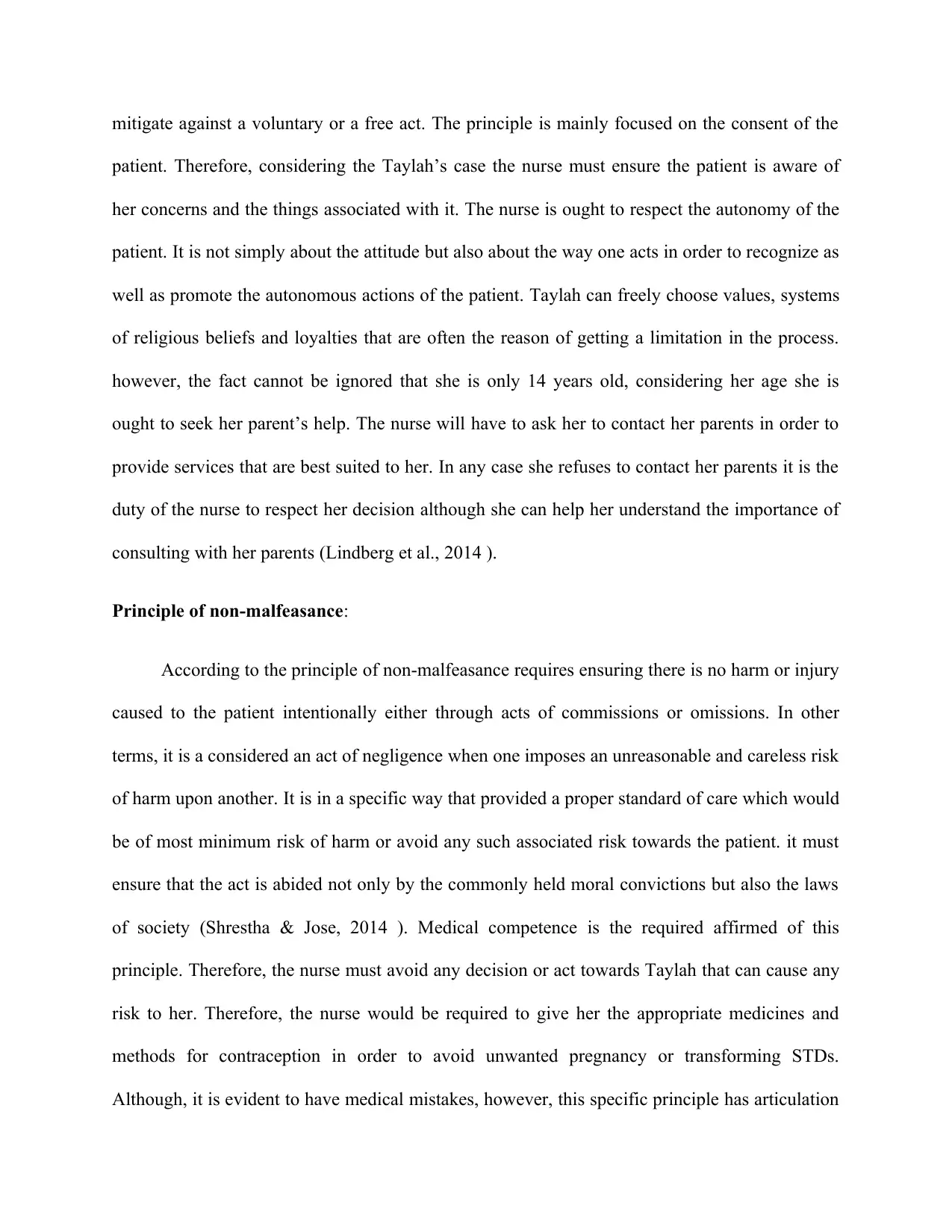
mitigate against a voluntary or a free act. The principle is mainly focused on the consent of the
patient. Therefore, considering the Taylah’s case the nurse must ensure the patient is aware of
her concerns and the things associated with it. The nurse is ought to respect the autonomy of the
patient. It is not simply about the attitude but also about the way one acts in order to recognize as
well as promote the autonomous actions of the patient. Taylah can freely choose values, systems
of religious beliefs and loyalties that are often the reason of getting a limitation in the process.
however, the fact cannot be ignored that she is only 14 years old, considering her age she is
ought to seek her parent’s help. The nurse will have to ask her to contact her parents in order to
provide services that are best suited to her. In any case she refuses to contact her parents it is the
duty of the nurse to respect her decision although she can help her understand the importance of
consulting with her parents (Lindberg et al., 2014 ).
Principle of non-malfeasance:
According to the principle of non-malfeasance requires ensuring there is no harm or injury
caused to the patient intentionally either through acts of commissions or omissions. In other
terms, it is a considered an act of negligence when one imposes an unreasonable and careless risk
of harm upon another. It is in a specific way that provided a proper standard of care which would
be of most minimum risk of harm or avoid any such associated risk towards the patient. it must
ensure that the act is abided not only by the commonly held moral convictions but also the laws
of society (Shrestha & Jose, 2014 ). Medical competence is the required affirmed of this
principle. Therefore, the nurse must avoid any decision or act towards Taylah that can cause any
risk to her. Therefore, the nurse would be required to give her the appropriate medicines and
methods for contraception in order to avoid unwanted pregnancy or transforming STDs.
Although, it is evident to have medical mistakes, however, this specific principle has articulation
patient. Therefore, considering the Taylah’s case the nurse must ensure the patient is aware of
her concerns and the things associated with it. The nurse is ought to respect the autonomy of the
patient. It is not simply about the attitude but also about the way one acts in order to recognize as
well as promote the autonomous actions of the patient. Taylah can freely choose values, systems
of religious beliefs and loyalties that are often the reason of getting a limitation in the process.
however, the fact cannot be ignored that she is only 14 years old, considering her age she is
ought to seek her parent’s help. The nurse will have to ask her to contact her parents in order to
provide services that are best suited to her. In any case she refuses to contact her parents it is the
duty of the nurse to respect her decision although she can help her understand the importance of
consulting with her parents (Lindberg et al., 2014 ).
Principle of non-malfeasance:
According to the principle of non-malfeasance requires ensuring there is no harm or injury
caused to the patient intentionally either through acts of commissions or omissions. In other
terms, it is a considered an act of negligence when one imposes an unreasonable and careless risk
of harm upon another. It is in a specific way that provided a proper standard of care which would
be of most minimum risk of harm or avoid any such associated risk towards the patient. it must
ensure that the act is abided not only by the commonly held moral convictions but also the laws
of society (Shrestha & Jose, 2014 ). Medical competence is the required affirmed of this
principle. Therefore, the nurse must avoid any decision or act towards Taylah that can cause any
risk to her. Therefore, the nurse would be required to give her the appropriate medicines and
methods for contraception in order to avoid unwanted pregnancy or transforming STDs.
Although, it is evident to have medical mistakes, however, this specific principle has articulation
Paraphrase This Document
Need a fresh take? Get an instant paraphrase of this document with our AI Paraphraser
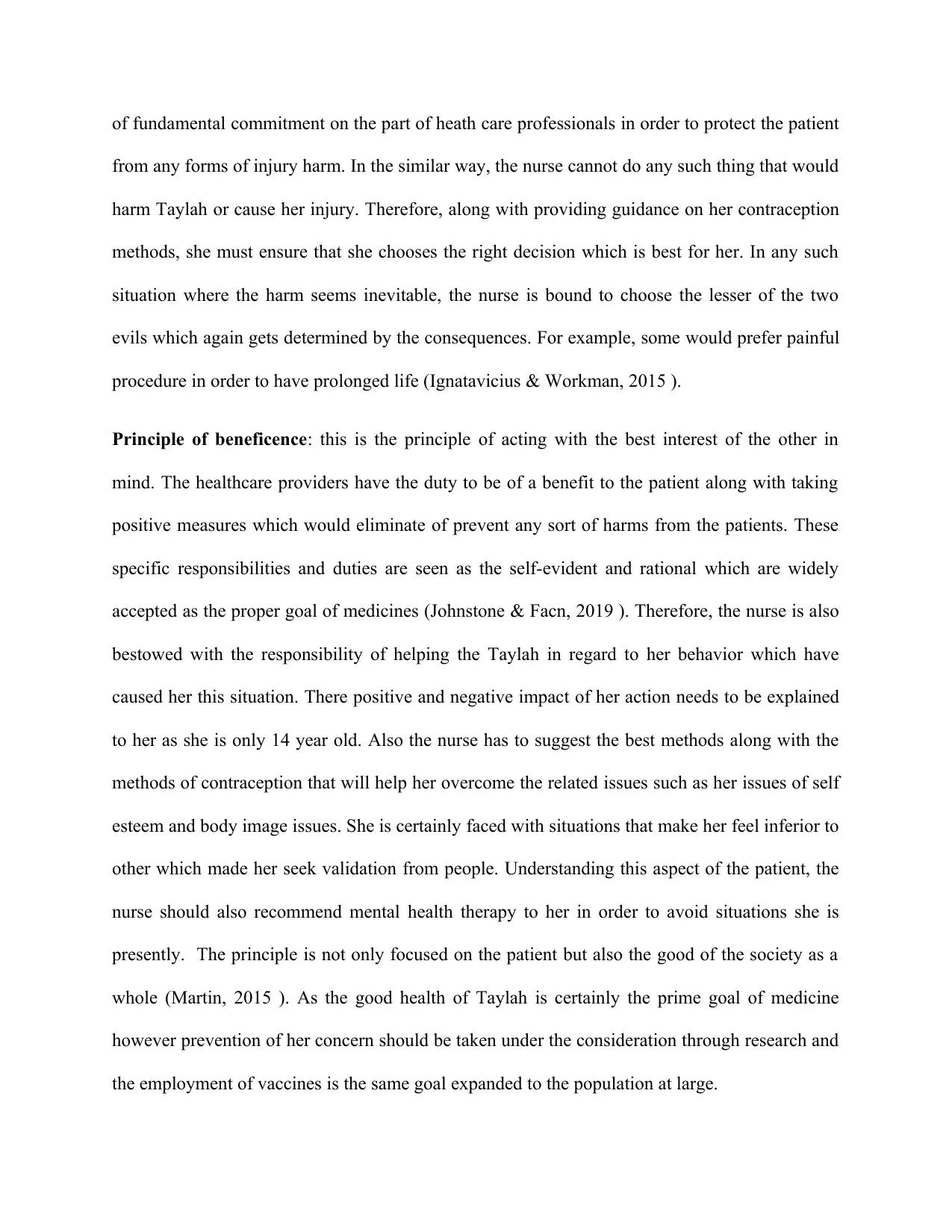
of fundamental commitment on the part of heath care professionals in order to protect the patient
from any forms of injury harm. In the similar way, the nurse cannot do any such thing that would
harm Taylah or cause her injury. Therefore, along with providing guidance on her contraception
methods, she must ensure that she chooses the right decision which is best for her. In any such
situation where the harm seems inevitable, the nurse is bound to choose the lesser of the two
evils which again gets determined by the consequences. For example, some would prefer painful
procedure in order to have prolonged life (Ignatavicius & Workman, 2015 ).
Principle of beneficence: this is the principle of acting with the best interest of the other in
mind. The healthcare providers have the duty to be of a benefit to the patient along with taking
positive measures which would eliminate of prevent any sort of harms from the patients. These
specific responsibilities and duties are seen as the self-evident and rational which are widely
accepted as the proper goal of medicines (Johnstone & Facn, 2019 ). Therefore, the nurse is also
bestowed with the responsibility of helping the Taylah in regard to her behavior which have
caused her this situation. There positive and negative impact of her action needs to be explained
to her as she is only 14 year old. Also the nurse has to suggest the best methods along with the
methods of contraception that will help her overcome the related issues such as her issues of self
esteem and body image issues. She is certainly faced with situations that make her feel inferior to
other which made her seek validation from people. Understanding this aspect of the patient, the
nurse should also recommend mental health therapy to her in order to avoid situations she is
presently. The principle is not only focused on the patient but also the good of the society as a
whole (Martin, 2015 ). As the good health of Taylah is certainly the prime goal of medicine
however prevention of her concern should be taken under the consideration through research and
the employment of vaccines is the same goal expanded to the population at large.
from any forms of injury harm. In the similar way, the nurse cannot do any such thing that would
harm Taylah or cause her injury. Therefore, along with providing guidance on her contraception
methods, she must ensure that she chooses the right decision which is best for her. In any such
situation where the harm seems inevitable, the nurse is bound to choose the lesser of the two
evils which again gets determined by the consequences. For example, some would prefer painful
procedure in order to have prolonged life (Ignatavicius & Workman, 2015 ).
Principle of beneficence: this is the principle of acting with the best interest of the other in
mind. The healthcare providers have the duty to be of a benefit to the patient along with taking
positive measures which would eliminate of prevent any sort of harms from the patients. These
specific responsibilities and duties are seen as the self-evident and rational which are widely
accepted as the proper goal of medicines (Johnstone & Facn, 2019 ). Therefore, the nurse is also
bestowed with the responsibility of helping the Taylah in regard to her behavior which have
caused her this situation. There positive and negative impact of her action needs to be explained
to her as she is only 14 year old. Also the nurse has to suggest the best methods along with the
methods of contraception that will help her overcome the related issues such as her issues of self
esteem and body image issues. She is certainly faced with situations that make her feel inferior to
other which made her seek validation from people. Understanding this aspect of the patient, the
nurse should also recommend mental health therapy to her in order to avoid situations she is
presently. The principle is not only focused on the patient but also the good of the society as a
whole (Martin, 2015 ). As the good health of Taylah is certainly the prime goal of medicine
however prevention of her concern should be taken under the consideration through research and
the employment of vaccines is the same goal expanded to the population at large.
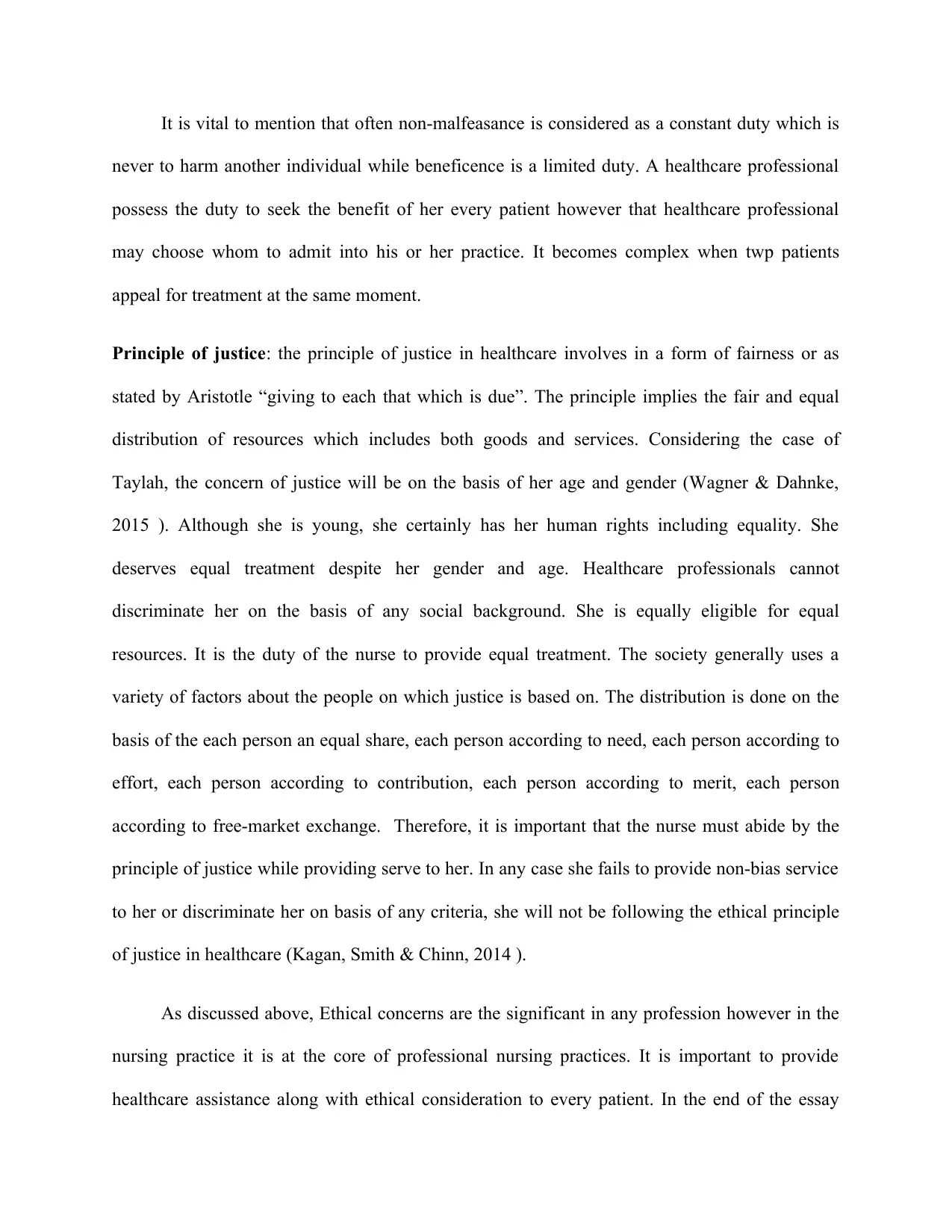
It is vital to mention that often non-malfeasance is considered as a constant duty which is
never to harm another individual while beneficence is a limited duty. A healthcare professional
possess the duty to seek the benefit of her every patient however that healthcare professional
may choose whom to admit into his or her practice. It becomes complex when twp patients
appeal for treatment at the same moment.
Principle of justice: the principle of justice in healthcare involves in a form of fairness or as
stated by Aristotle “giving to each that which is due”. The principle implies the fair and equal
distribution of resources which includes both goods and services. Considering the case of
Taylah, the concern of justice will be on the basis of her age and gender (Wagner & Dahnke,
2015 ). Although she is young, she certainly has her human rights including equality. She
deserves equal treatment despite her gender and age. Healthcare professionals cannot
discriminate her on the basis of any social background. She is equally eligible for equal
resources. It is the duty of the nurse to provide equal treatment. The society generally uses a
variety of factors about the people on which justice is based on. The distribution is done on the
basis of the each person an equal share, each person according to need, each person according to
effort, each person according to contribution, each person according to merit, each person
according to free-market exchange. Therefore, it is important that the nurse must abide by the
principle of justice while providing serve to her. In any case she fails to provide non-bias service
to her or discriminate her on basis of any criteria, she will not be following the ethical principle
of justice in healthcare (Kagan, Smith & Chinn, 2014 ).
As discussed above, Ethical concerns are the significant in any profession however in the
nursing practice it is at the core of professional nursing practices. It is important to provide
healthcare assistance along with ethical consideration to every patient. In the end of the essay
never to harm another individual while beneficence is a limited duty. A healthcare professional
possess the duty to seek the benefit of her every patient however that healthcare professional
may choose whom to admit into his or her practice. It becomes complex when twp patients
appeal for treatment at the same moment.
Principle of justice: the principle of justice in healthcare involves in a form of fairness or as
stated by Aristotle “giving to each that which is due”. The principle implies the fair and equal
distribution of resources which includes both goods and services. Considering the case of
Taylah, the concern of justice will be on the basis of her age and gender (Wagner & Dahnke,
2015 ). Although she is young, she certainly has her human rights including equality. She
deserves equal treatment despite her gender and age. Healthcare professionals cannot
discriminate her on the basis of any social background. She is equally eligible for equal
resources. It is the duty of the nurse to provide equal treatment. The society generally uses a
variety of factors about the people on which justice is based on. The distribution is done on the
basis of the each person an equal share, each person according to need, each person according to
effort, each person according to contribution, each person according to merit, each person
according to free-market exchange. Therefore, it is important that the nurse must abide by the
principle of justice while providing serve to her. In any case she fails to provide non-bias service
to her or discriminate her on basis of any criteria, she will not be following the ethical principle
of justice in healthcare (Kagan, Smith & Chinn, 2014 ).
As discussed above, Ethical concerns are the significant in any profession however in the
nursing practice it is at the core of professional nursing practices. It is important to provide
healthcare assistance along with ethical consideration to every patient. In the end of the essay
⊘ This is a preview!⊘
Do you want full access?
Subscribe today to unlock all pages.

Trusted by 1+ million students worldwide
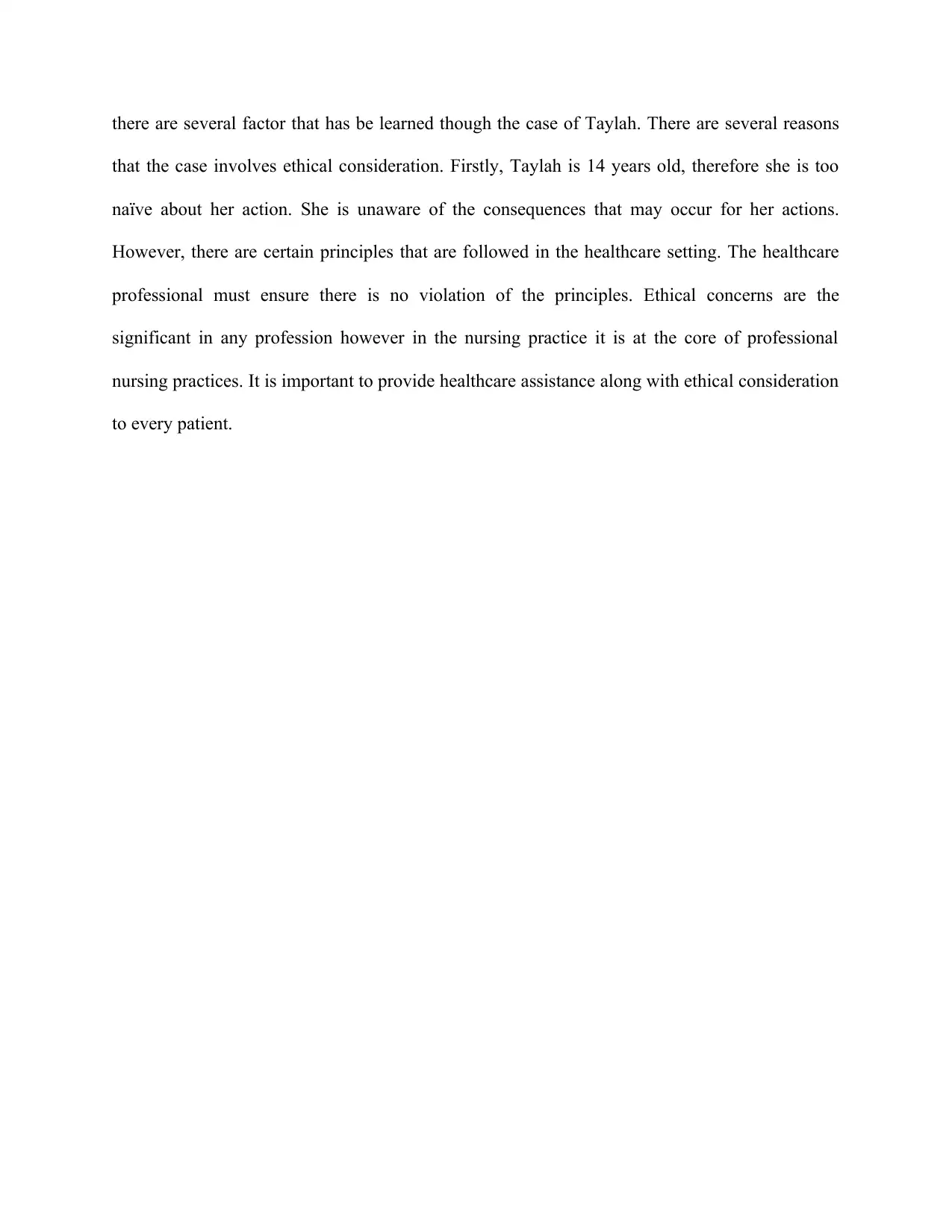
there are several factor that has be learned though the case of Taylah. There are several reasons
that the case involves ethical consideration. Firstly, Taylah is 14 years old, therefore she is too
naïve about her action. She is unaware of the consequences that may occur for her actions.
However, there are certain principles that are followed in the healthcare setting. The healthcare
professional must ensure there is no violation of the principles. Ethical concerns are the
significant in any profession however in the nursing practice it is at the core of professional
nursing practices. It is important to provide healthcare assistance along with ethical consideration
to every patient.
that the case involves ethical consideration. Firstly, Taylah is 14 years old, therefore she is too
naïve about her action. She is unaware of the consequences that may occur for her actions.
However, there are certain principles that are followed in the healthcare setting. The healthcare
professional must ensure there is no violation of the principles. Ethical concerns are the
significant in any profession however in the nursing practice it is at the core of professional
nursing practices. It is important to provide healthcare assistance along with ethical consideration
to every patient.
Paraphrase This Document
Need a fresh take? Get an instant paraphrase of this document with our AI Paraphraser
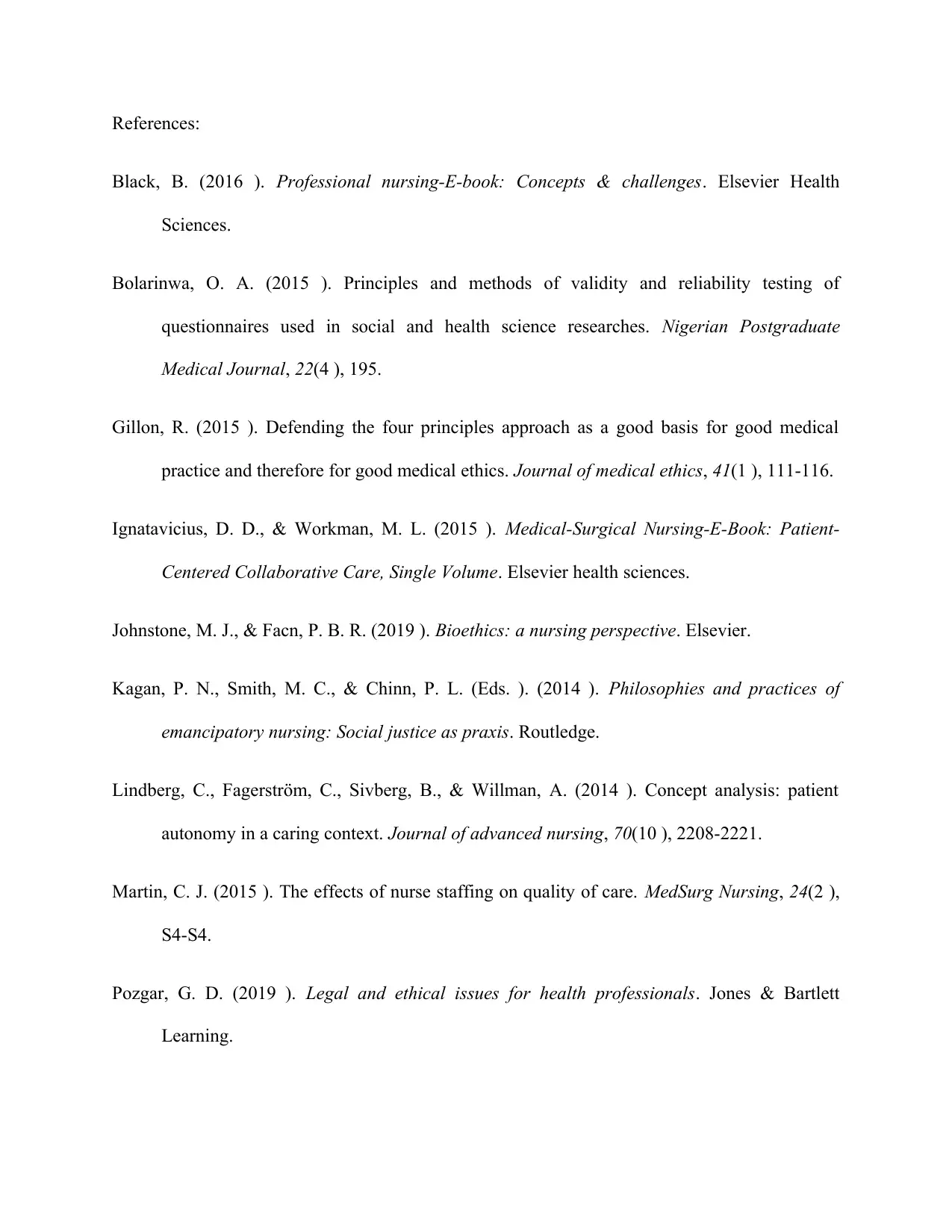
References:
Black, B. (2016 ). Professional nursing-E-book: Concepts & challenges. Elsevier Health
Sciences.
Bolarinwa, O. A. (2015 ). Principles and methods of validity and reliability testing of
questionnaires used in social and health science researches. Nigerian Postgraduate
Medical Journal, 22(4 ), 195.
Gillon, R. (2015 ). Defending the four principles approach as a good basis for good medical
practice and therefore for good medical ethics. Journal of medical ethics, 41(1 ), 111-116.
Ignatavicius, D. D., & Workman, M. L. (2015 ). Medical-Surgical Nursing-E-Book: Patient-
Centered Collaborative Care, Single Volume. Elsevier health sciences.
Johnstone, M. J., & Facn, P. B. R. (2019 ). Bioethics: a nursing perspective. Elsevier.
Kagan, P. N., Smith, M. C., & Chinn, P. L. (Eds. ). (2014 ). Philosophies and practices of
emancipatory nursing: Social justice as praxis. Routledge.
Lindberg, C., Fagerström, C., Sivberg, B., & Willman, A. (2014 ). Concept analysis: patient
autonomy in a caring context. Journal of advanced nursing, 70(10 ), 2208-2221.
Martin, C. J. (2015 ). The effects of nurse staffing on quality of care. MedSurg Nursing, 24(2 ),
S4-S4.
Pozgar, G. D. (2019 ). Legal and ethical issues for health professionals. Jones & Bartlett
Learning.
Black, B. (2016 ). Professional nursing-E-book: Concepts & challenges. Elsevier Health
Sciences.
Bolarinwa, O. A. (2015 ). Principles and methods of validity and reliability testing of
questionnaires used in social and health science researches. Nigerian Postgraduate
Medical Journal, 22(4 ), 195.
Gillon, R. (2015 ). Defending the four principles approach as a good basis for good medical
practice and therefore for good medical ethics. Journal of medical ethics, 41(1 ), 111-116.
Ignatavicius, D. D., & Workman, M. L. (2015 ). Medical-Surgical Nursing-E-Book: Patient-
Centered Collaborative Care, Single Volume. Elsevier health sciences.
Johnstone, M. J., & Facn, P. B. R. (2019 ). Bioethics: a nursing perspective. Elsevier.
Kagan, P. N., Smith, M. C., & Chinn, P. L. (Eds. ). (2014 ). Philosophies and practices of
emancipatory nursing: Social justice as praxis. Routledge.
Lindberg, C., Fagerström, C., Sivberg, B., & Willman, A. (2014 ). Concept analysis: patient
autonomy in a caring context. Journal of advanced nursing, 70(10 ), 2208-2221.
Martin, C. J. (2015 ). The effects of nurse staffing on quality of care. MedSurg Nursing, 24(2 ),
S4-S4.
Pozgar, G. D. (2019 ). Legal and ethical issues for health professionals. Jones & Bartlett
Learning.
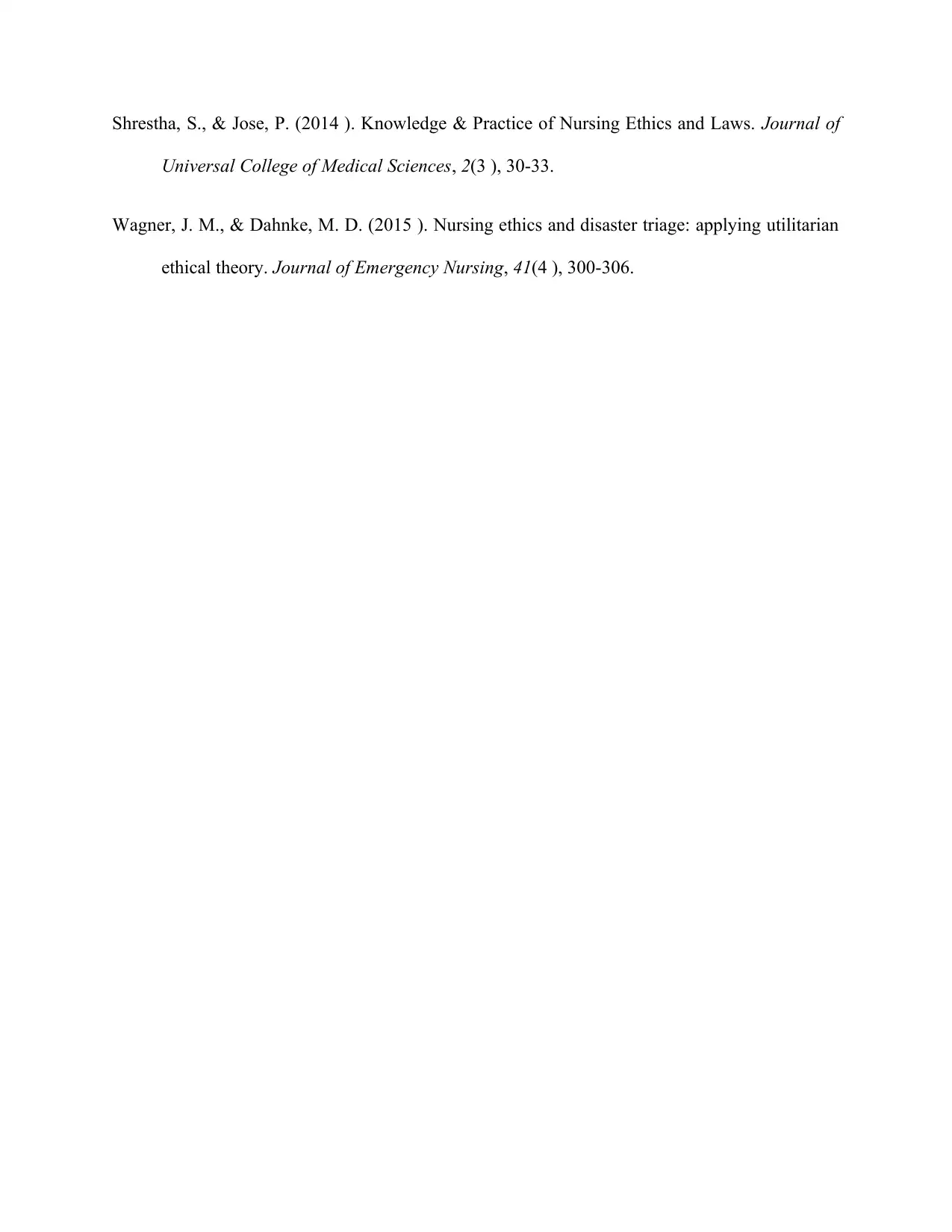
Shrestha, S., & Jose, P. (2014 ). Knowledge & Practice of Nursing Ethics and Laws. Journal of
Universal College of Medical Sciences, 2(3 ), 30-33.
Wagner, J. M., & Dahnke, M. D. (2015 ). Nursing ethics and disaster triage: applying utilitarian
ethical theory. Journal of Emergency Nursing, 41(4 ), 300-306.
Universal College of Medical Sciences, 2(3 ), 30-33.
Wagner, J. M., & Dahnke, M. D. (2015 ). Nursing ethics and disaster triage: applying utilitarian
ethical theory. Journal of Emergency Nursing, 41(4 ), 300-306.
⊘ This is a preview!⊘
Do you want full access?
Subscribe today to unlock all pages.

Trusted by 1+ million students worldwide
1 out of 9
Related Documents
Your All-in-One AI-Powered Toolkit for Academic Success.
+13062052269
info@desklib.com
Available 24*7 on WhatsApp / Email
![[object Object]](/_next/static/media/star-bottom.7253800d.svg)
Unlock your academic potential
Copyright © 2020–2026 A2Z Services. All Rights Reserved. Developed and managed by ZUCOL.





